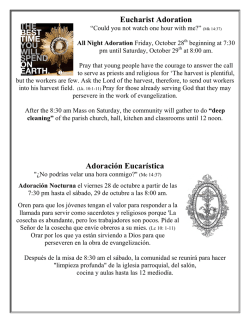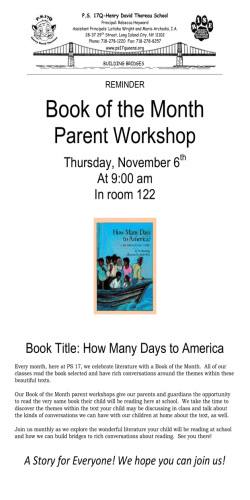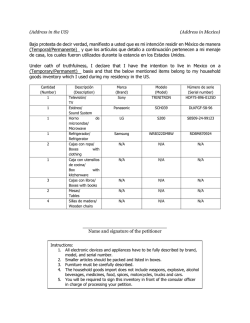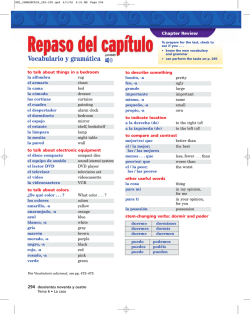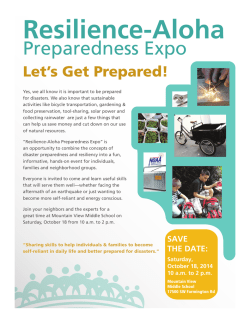
WMO-1436-WDS-DRR-MHEW-Conf
Nuestra ref.: WDS/DRR/MHEW Conf GINEBRA, 12 de diciembre de 2016 Anexo: 1 (disponible en inglés solamente) Asunto: Invitación para patrocinar la Conferencia sobre alerta temprana multirriesgos (22 y 23 de mayo de 2017, Cancún, México) Excelentísimo señor/Excelentísima señora: Tengo el honor de informarle de que la Conferencia sobre alerta temprana multirriesgos, que el Gobierno de México tendrá la amabilidad de acoger, se celebrará los días 22 y 23 de mayo de 2017 en Cancún (México). Esta Conferencia se celebrará conjuntamente con la Plataforma Mundial para la Reducción del Riesgo de Desastres de 2017, que está siendo coordinada por la Oficina de las Naciones Unidas para la Reducción del Riesgo de Desastres (UNISDR), y servirá de base para la reunión sobre alerta temprana programada durante la jornada de apertura de la Plataforma (24 de mayo de 2017). Para entonces habrán pasado más de diez años desde que se celebró la última Conferencia internacional sobre alerta temprana. En ese lapso de tiempo los sistemas y métodos utilizados para proporcionar alertas tempranas han evolucionado, en particular aquellos que alertan sobre múltiples riesgos que pueden darse de forma simultánea, en cascada o de forma acumulativa a lo largo del tiempo. Los resultados de la Conferencia destacarán las estrategias y medidas para crear, promover y consolidar los sistemas de alerta temprana multirriesgos, y también contribuirán a lograr la meta "g" del Marco de Sendai [de]: incrementar considerablemente la disponibilidad de los sistemas de alerta temprana sobre amenazas múltiples y de la información y las evaluaciones sobre el riesgo de desastres transmitidas a las personas, y el acceso a ellos, para 2030. Se adjunta el folleto de la Conferencia, el cual proporciona información general, menciona a las partes interesadas pertinentes y presenta los principales resultados esperados. Se invita a los países que ya han puesto en marcha sistemas de alerta temprana a participar en la Conferencia para proporcionar ejemplos de buenas prácticas. Sin embargo, muchos países carecen de sistemas y procesos adecuados para proporcionar las alertas tempranas necesarias para alcanzar la meta "g" y necesitamos fondos para que esos países puedan participar en la Conferencia y beneficiarse de la experiencia. Por tales motivos, le invito por la presente a patrocinar este evento en la manera que mejor le convenga. Confiamos en que los objetivos y los resultados esperados de la Conferencia se ajusten a sus intereses y prioridades. A los Ministros de Relaciones Exteriores de los Miembros de la Organización Meteorológica Mundial (WMO-1436) -2Se enviara una copia de esta carta al Representante Perma nente de su pa ls ante la OMM. Aprovecho esta ocasion para reiterarle, excelentfsimo senor/excelentfsima senora, el testimonio de mi mas alta y distinguida consideracion. l_,,~ (P. Taalas) Secretario General WEATHER CLIMATE WATER 22 TO 23 MAY 2017, CANCUN, MEXICO MULTI-HAZARD EARLY WARNING CONFERENCE INFORMATION NOTE The Multi-Hazard Early Warning Conference aims to demonstrate to countries how they can improve the availability of, and their communities’ access to, multi-hazard early warning, risk information and assessment. The Conference will be held from 22 to 23 May in Cancún, Mexico, kindly hosted by the government of Mexico, in connection with the United Nations Office for Disaster Risk Reduction (UNISDR) Global Platform for Disaster Risk Reduction. The Conference deliberations and outcomes will: • Guide investments by countries and international organizations for effective, impact based, multi-hazard early warning systems. • Review progress by countries’ efforts to establish early warning systems against the Sendai Framework, the 2030 Sustainable Development Agenda and the Climate Change Paris Agenda. • Learn from, exchange information on and promote the replication of good practices in early warning systems. Disasters are increasing in frequency and severity all around the globe, with climate change and variability exacerbating the situation, causing major disturbances with human, environmental and economical consequences. Significant gaps remain in providing early warnings to deal with these events, especially in reaching the “last mile” - the most vulnerable and exposed populations with timely, understandable and actionable warning information. Many developing countries, including least developed countries (LDCs), small island developing states (SIDS), and landlocked developing countries (LLDCs), have not benefited from advances in the science, technology and governance behind early warning systems.The resulting societal benefits of early warning systems have therefore been spread unevenly across regions, countries and communities. A multi-hazard approach to early warning systems has been shown to be effective in dealing with multiple, sometimes concurrent, hazards, and can provide economies of scale and eventually sustainability of the system as a whole. Currently, efforts are needed to develop multi-hazard early warning systems (MHEWSs) that are guided by risk and impact information and that include feedback mechanisms for continuous improvement. Such approaches require coordination, expertise and continuous learning by relevant stakeholders. The Conference is expected to serve as a Preparatory Meeting on Early Warning for the Global Platform, complementing the overarching goals of the Platform, and specifically providing more detailed background to the Early Warning Session planned to be held on the opening day of the Platform. Relevant stakeholders include • All countries, but in particular, those who stand to benefit the most from further development of MHEWSs such as LDC, SIDS and LLDC; • National disaster risk management/civil protection agencies; • National meteorological and hydrological services, geological surveys and institutes, health organizations and related scientific and academic institutions from nations that are interested to share good practice examples; • Government representatives from different sectors – including health, transport, environment, agriculture, finance, development cooperation requiring hazard information for better planning; • Private sector entities that play a major role in the provision of data and information and the operations of systems key to MHEWS efforts; • Regional organizations supporting the development and provision of early warnings; and • Key intergovernmental and international organizations including United Nations entities, the International Red Cross/Red Crescent Movement and international financial institutions. Expected outcomes The Conference will build upon the three International Conferences on Early Warning that were held in 1998, 2003 and 2006 (EWC I-III). The Conference outcomes will highlight strategies and actions to build, promote and strengthen MHEWSs, especially how to address key gaps such as faster and broader dissemination of warnings and the quality of the information provided to those at risk at the “last mile”,through capacity development, operational support and improved coordination and governance. The Conference will be used to define an approach to establish national baselines on early warning systems to be used by government agencies to report on advances in early warning efforts on a periodic basis, as contemplated in the Sendai Framework. One goal is therefore to take stock of the current level of development of single and multi-hazard early warning systems, including their effectiveness, related actors and partnerships, and coordination mechanisms. Specifically, the Conference will provide a good platform for the participants from countries not possessing appropriate EWSs to appraise themselves about the latest advances in this area and the strategies to implement MHEWSs in their countries. It will also provide a platform to present innovative project proposals and latest advancements in science and technology. Conference Structure The Conference is foreseen to consist of plenary sessions, including panel discussions, a poster session and an exhibition. A possibility to organize side-meetings will be provided. Contributions The Conference organizers are open to financial and in-kind contributions in support of the conference. Contributions will be acknowledged as per agreement, for example by appropriate display of logo in conference materials. The Climate Risk Early Warning Systems (CREWS) is supporting the participation of representatives and experts from SIDS and LCDs. Organizations involved in the preliminary planning process: IFRC, UNDP, UNEP, UNESCO, UNESCO-IOC, UNISDR, UNOOSA/ UNSPIDER, World Bank, WHO, WMO. Weather and Disaster Risk Reduction Services Department E-mail: [email protected] – Tel.: +41 (0) 22 730 80 06 – Fax: +41 (0) 22 730 81 28 – public.wmo.int JN 161799 On behalf of the organizers: For more information, please contact: World Meteorological Organization 7 bis, avenue de la Paix – P.O. Box 2300 – CH 1211 Geneva 2 – Switzerland
© Copyright 2026

